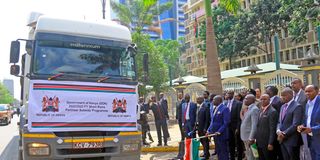Subsidise all farm inputs

Deputy President Rigathi Gachagua flags off of DAP subsidised fertiliser to various regions of Kenya on September 22, 2022 at Harambee House Annex grounds.
Last week, Deputy President Rigathi Gachagua flagged off subsidised fertiliser destined for various parts of the country as a way of supporting farmers to produce more food to fight hunger.
The cheaper fertiliser is a big relief for farmers. The government issued new prices as: DAP Sh3,500, CAN Sh3,875, Urea Sh3,450, NPK Sh3,275, MOP Sh1, 775 and Sulphate of Ammonia Sh2, 220.
Agriculture is the best tool we have to fight food insecurity, unemployment and poverty. Statistics show it is the largest source of income and the economic backbone of the country. More than 75 per cent of Kenyans partly make a living from agriculture. The sector accounts for more than a quarter of gross domestic product (GDP) and employs more than 44 per cent of the population.
Farmers can produce enough food for the country but lack modern equipment, technology, inputs, finances or extension services. That has pulled back the economy, resulting in high food prices. At present, more than a million people face hunger.
Agricultural inputs
The fertiliser subsidy is not enough. Farmers also require other agricultural inputs, such as seeds to prepare the land. The government should devise novel strategies to support farmers to adopt modern farming methods like irrigation so that farming is continuous, subsidise seeds and structure the commodities market better. That would minimise inefficiencies and transform smallholder farming from a subsistence economy to agribusiness.
Fight corruption in the sector so that subsidised inputs reach all the farmers, even in rural areas. Ease access to credit for farmers by giving them low-interest loans to run their enterprises smoothly.
Modernise agriculture, stop food imports and build more stores for farm produce. That will create employment, improve the standards of life, lower the cost of living and elevate food security and nutrition for the people.
Mr Sifuna is a journalism and communication student at Rongo University. [email protected].





